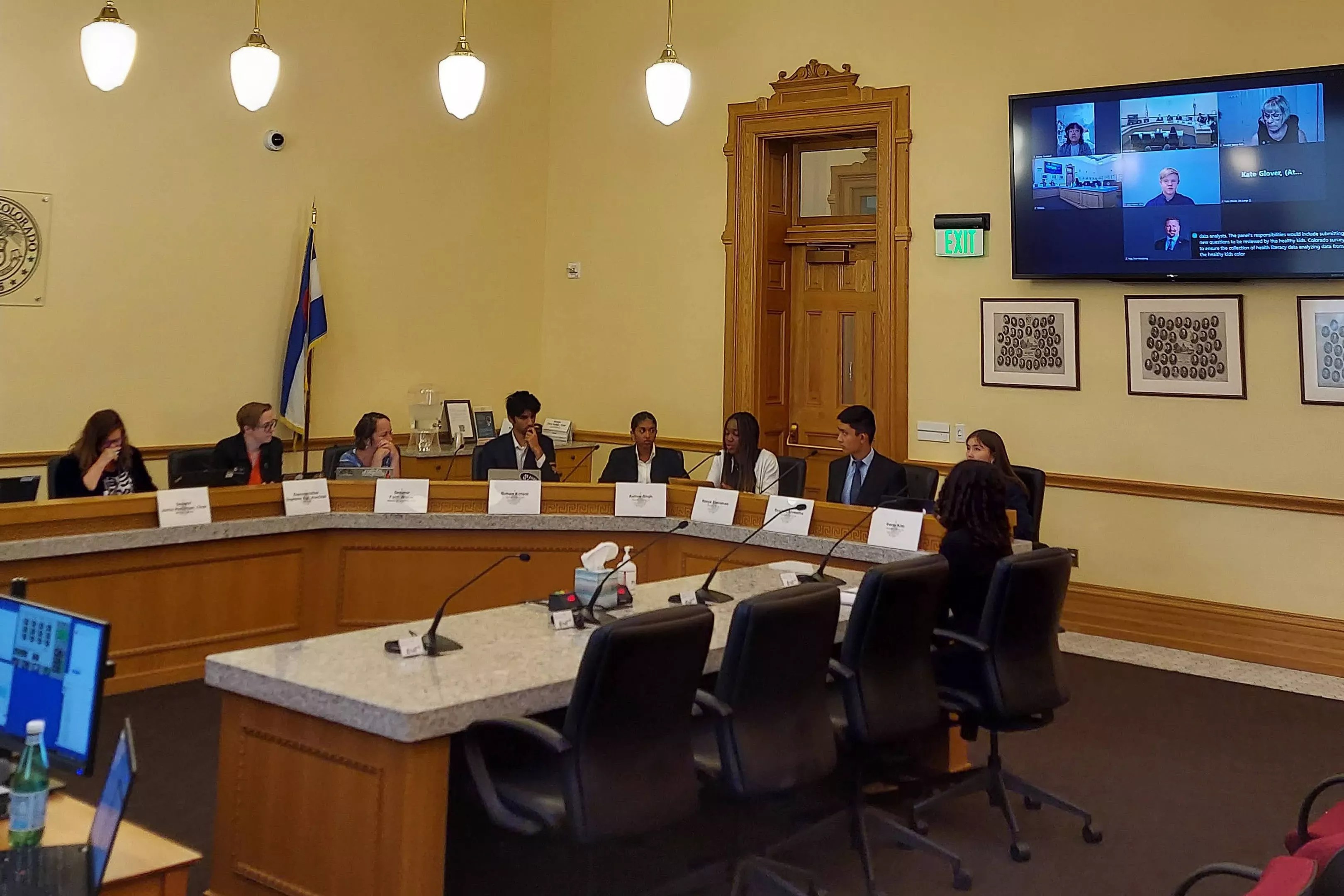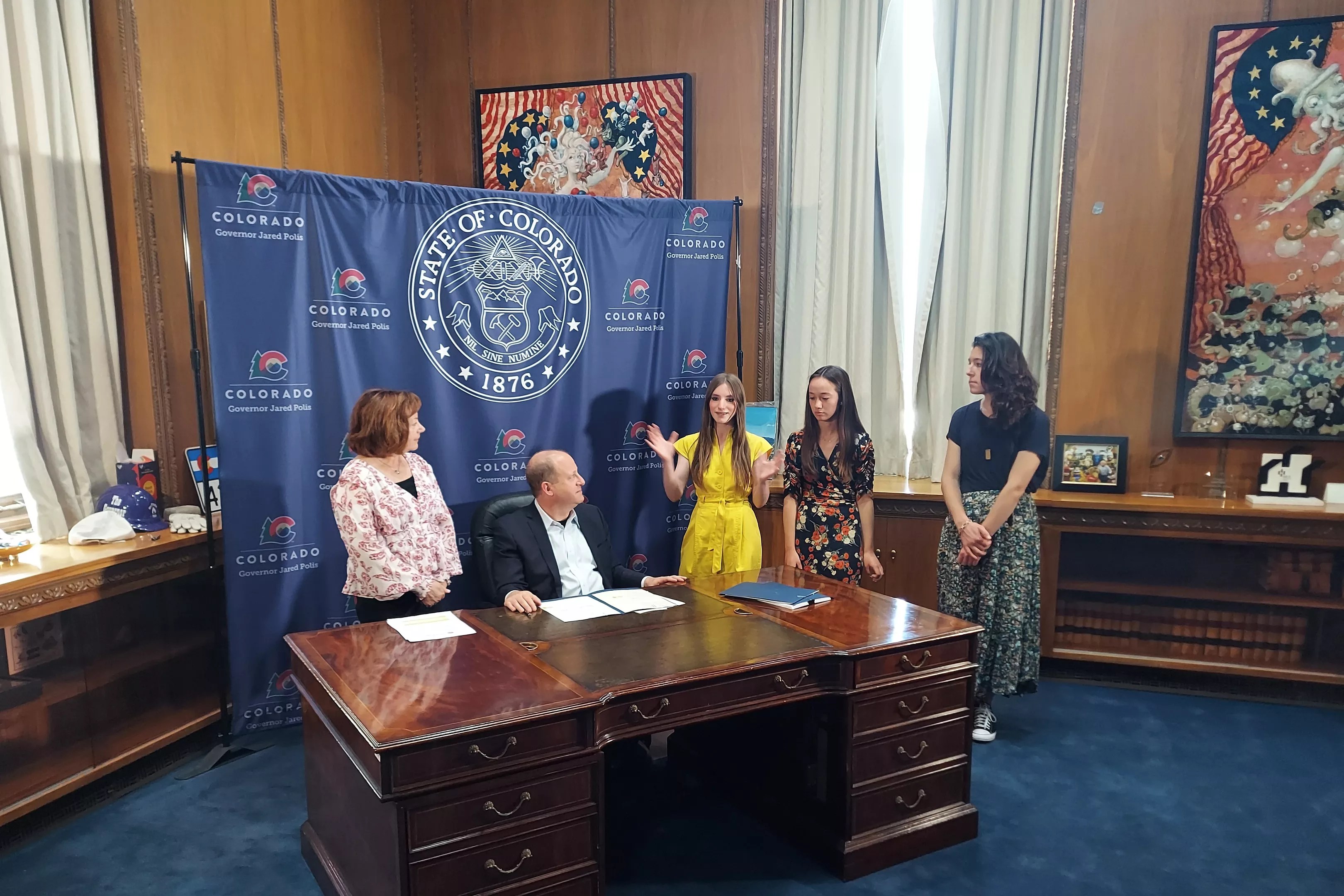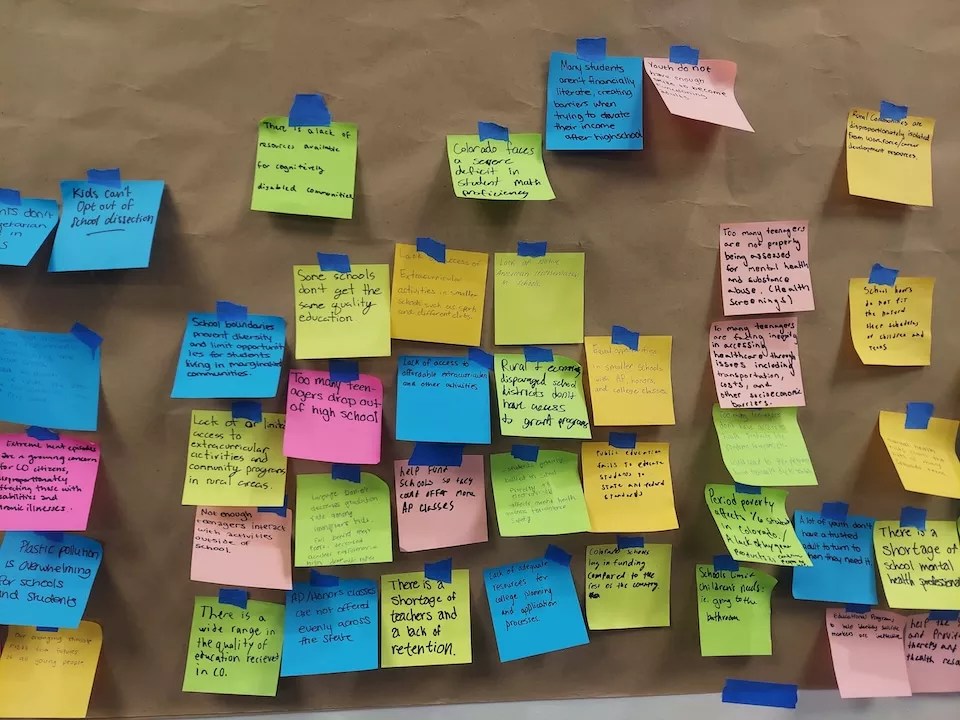
Sarah Moss

Audio By Carbonatix
Colorado legislators created a program seventeen years ago to work directly with teenagers on issues that impact young people. Around 350 middle and high schoolers have participated since then, developing proposals that resulted in state laws to provide college financial aid for foster youth, give free menstrual products to students, and study disproportionate discipline in schools, among many others.
In 2021, the late Hugh McKean called incorporating youth voices through the program his “greatest honor” as House Minority Leader. But the Colorado Youth Advisory Council may soon be eliminated, as legislators look to slash COYAC’s $50,000 annual budget to help address the state’s $1.2 billion budget shortfall.
The Senate Appropriations Committee advanced a bill on Friday, March 7, to allocate just $5,000 to COYAC next fiscal year, allowing the current group of teens to complete the program but not funding any future work. Lawmakers have to “make some hard decisions this year,” according to House Speaker Julie McCluskie.
“From my time working in schools, I value this opportunity for Colorado students to be involved with their government,” she says, “but we are facing a tough budget year exacerbated by a federal administration that has threatened to pull crucial federal funding.”
On March 7, the Senate Appropriations Committee also advanced a bill to suspend legislative interim committee activities in 2025. McCluskie says the legislature will be pausing “almost all” interim committees to “put as much funding as possible toward critical services that Coloradans want and need, such as Medicaid and K-12 education.”
COYAC supporters aren’t giving up, however. Current and former members of the program are reaching out to legislators, testifying in committee, writing opinion essays and starting petitions in the hope of saving the council.
“I had a pretty hard time in high school. I had some issues with bullying, I didn’t always feel like I had a safe environment at school. But I always knew I could come to COYAC,” says Aimee Resnick, a twenty-year-old college senior and COYAC alum. “It gave me a much more clear vision for what I wanted out of my career. It helped me push forward my life in a very positive way.”
Resnick joined the program as a high school sophomore. By the time she graduated, she had two state laws under her belt: one to add crisis hotline information to student ID cards and another to create a statewide public health program dedicated to preventing eating disorders.
Her work didn’t stop when she left COYAC. Resnick is pursuing a career in public service, studying social policy at Northwestern University. Last year she worked on successful state legislation to prohibit non-consensual deep-fake intimate images and add weight to the list of protected classes in anti-bullying laws. Today she’s working on a bill to improve the housing conditions of sheepherders in the San Luis Valley.
“Young people have a hard time connecting with state policy; it feels so far away and out of reach. COYAC brings it down to a level you can relate to,” Resnick says. “Young people already feel really disinvested in politics right now across the political spectrum. If we lose COYAC, it’s just further telling young people that politics is not the place that they belong.
“It’s also a loss for the state of Colorado,” she adds. “It’s divesting in young people who are interested in public service and want to work to better our state.”

Aimee Resnick (in yellow) speaks to Governor Jared Polis during a bill signing for one of her COYAC proposals.
Sarah Moss
COYAC Director Sarah Moss has seen the program’s impact on students firsthand.
“I’ve watched shy kids blossom into talented public speakers. I’ve watched cynical kids start to feel like they can make a difference and make real change. I’ve watched kids get interested in careers in public service,” Moss says. “I’ve seen the effect this program has on the students individually and the impact their work has statewide.”
Since 2021, Moss has spent around four hours every week with the forty students who make up each COYAC cohort, representing each of the state’s Senate districts as well as the Ute Mountain Ute and Southern Ute tribes. She teaches them the basics of government operations and helps facilitate their work as the students identify problems facing their communities and explore state-level policy solutions.
This year, the students helped produce a measure seeking to clarify school policies about possessing and administering opioid antagonists like Narcan. They’re also trying to pass bills that would add youth members to Colorado’s Environmental Justice Advisory Board and reduce food waste in public schools.
“This is a great example of a policy proposal that came from the day-to-day experience of a teenager who saw food getting thrown in the trash and piling up in her school cafeteria,” Moss says. “They come up with ideas that adults haven’t come up with that make real change.”
Senator Faith Winter, a legislative member of the COYAC committee, plans to introduce an amendment to restore COYAC’s $50,000 annual budget.
“I believe they were made an example of for how hard the budget is going to be this year, even though $50,000 is so small,” Winter says. “I think that’s unfair to our youth who give hours and hours of work in order to have their voice at the legislature.”
Winter’s proposal already has some backing. During the Appropriations Committee meeting, Senator Jeff Bridges said he will support fully funding COYAC. “I think this is an incredible experience for young people,” he added.
Not all Democrats are on board.
“It’s not like I don’t want these committees to continue; it’s the fact that we have, as alleged, a structural deficit and we’ve been asked to find cuts,” Senator Robert Rodriguez said during the meeting. “We’ve been tasked to reduce fiscal notes, and we are making an attempt and trying not to pick winners and losers and trying to be consistent.”
Senate President James Coleman says he doesn’t think anyone is planning to run a bill to permanently end COYAC, suggesting the funding cut would be temporary. “We’re suspending but not repealing COYAC,” Coleman says. “Our goal is to continue it, but we have to figure out the budget constraints that we have.”
However, the state’s budgetary issues will not be solved in one year. By 2026, legislators would either need to restore the program’s funding to restart with a new group of students, or reduce the funding to zero since all of the participants will have finished – meaning legislators would eventually need to run a bill to end the program before they can fully eliminate its funding, according to Legislative Council Staff.
Winter says a bill to end COYAC is on its way this session, and she plans to fight it.
“It depends on who on the Executive Committee [of the Legislative Council] you talk to. Some members believe this is a pause, and some members believe this is moving forward without COYAC,” she says. “If it is a pause, in my experience, it’s really hard to take away a program and bring it back. …I know that it’s an incredibly difficult fiscal year, but it would be a huge mistake to get rid of COYAC.”
Some state legislators have raised issues with COYAC outside of budgetary concerns. Republicans have accused the program of being too liberal. During the 2024 legislative session, the teens brought forward bills to allow transgender and nonbinary students to change their names in school, and to study the gaps in access to gender-affirming healthcare in Colorado.
“I think COYAC has wandered away from the mission that it once had. It’s become very different in its nature, so as a matter of policy, I’m not supportive of continuing to fund it,” Senate Minority Leader Paul Lundeen said during an Executive Committee meeting on February 18.
During the same meeting, House Minority Leader Rose Pugliese suggested the program was not necessary: “With all due respect to students, there are plenty of people who come here and take days to testify and make their voices heard that don’t get paid,” Pugliese said.
While COYAC students do not get paid for their involvement, their meals and mileage are covered for the days they are required to travel to the State Capitol Building, Moss says. The $50,000 budget also pays for a two-day retreat where students work on policy proposals, nonpartisan staffing and coaching, as well as an award ceremony and send-off dinner for students completing their two-year terms.

Student-written problem statements during COYAC’s 2024 retreat.
Sarah Moss
Supporters note that the program’s students come from every Senate district in the state, so their political leanings largely align with Colorado as a whole. The staff that works with the students are nonpartisan, the COYAC legislative committee is bipartisan, and the program was created by a Republican legislator in 2008.
Winter says she fears the COYAC youth are getting caught “in the crosshairs of politics.”
“They’ve made an incredible difference in our state,” she adds. “You can’t measure that impact with $50,000.”